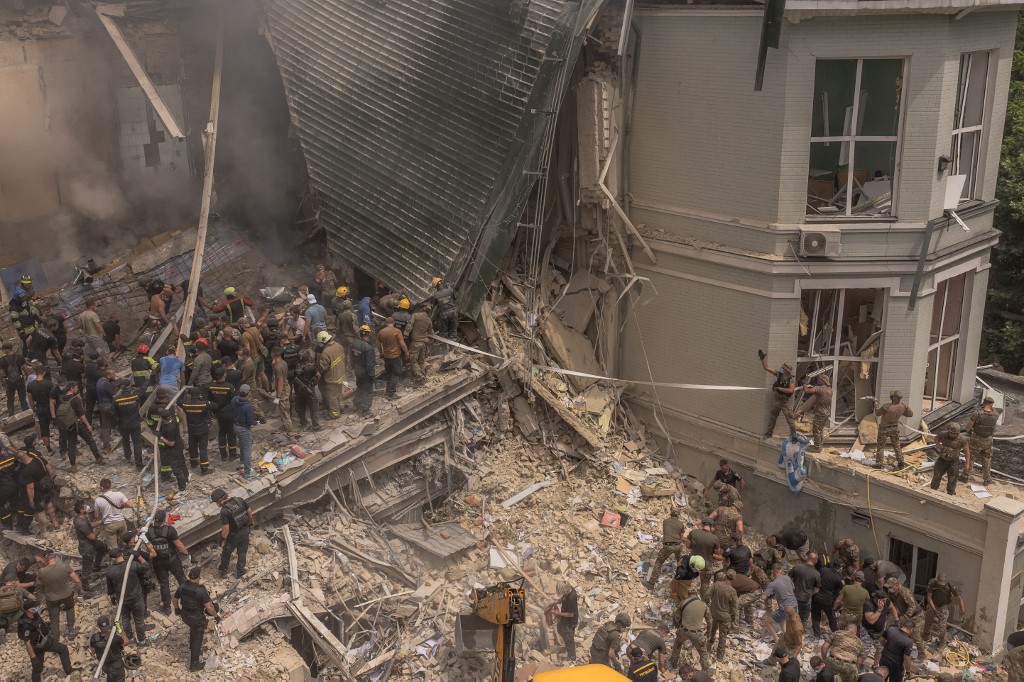As Republicans prepare to convene in Milwaukee next week, the posture of Evangelicals is rapidly shifting on Ukraine in response to a months-long drumbeat of news reports documenting Russia’s persecution of Christians in occupied territories of Ukraine.
This shift has significant political and policy ramifications because self-identified Christian Evangelicals are the most reliable and, arguably, the most important bloc of voters in the Trump coalition. Of the 74.2 million votes Trump received in 2020, 45.4 percent (33.7 million) were white Evangelical Christians, according to exit polls.
JOIN US ON TELEGRAM
Follow our coverage of the war on the @Kyivpost_official.
Ukraine aid: no longer a litmus test.
Last fall, skepticism of Ukraine funding was widespread among Republicans. A report in The New York Times even asserted that “opposition to helping Kyiv has become a litmus test for the right.” But by spring, The New York Times was reporting that lawmakers who supported Ukraine aid were encountering surprisingly “little resistance from voters.”
This extraordinary shift among Republicans was driven by Evangelicals whose opposition to Ukraine aid softened as virtually every major Christian news publication began ramping up coverage of the atrocities committed against Ukraine’s Christians by occupying Russian troops. Publications like The Baptist Press, The Baptist Standard, Christian Post, Christianity Today, and Christian Broadcasting Network (CBN) published scores of stories chronicling the targeted persecution of Ukrainian Christians.

German Opposition Supports Combat Aircraft Deliveries to Ukraine
By the time Congress was preparing to vote on a $61 billion aid package in April 2024, Evangelicals had become the most vocal backers of the legislation. Indeed, it was “a last-minute” push from “a spectrum of religious groups” that propelled the aid package across the finish line in Congress, according to Religion News Service. CBN reported that Evangelicals played “a key role” in passage of the foreign aid bill. The Financial Times attributed Speaker Johnson’s reversal on Ukraine to “a campaign by evangelicals.”
Why evangelicals are coalescing around aid for Ukraine
Last month, I traveled to Kyiv to participate in Ukraine’s annual National Prayer Breakfast, an event that brought together hundreds of current and former elected officials, diplomats, and religious leaders from the United States and Europe. In its thirteenth year, the event is now the most-attended government-sanctioned religious event in all of Europe.
In speaking to dozens of Ukrainian and Evangelical leaders, I came away with three themes that help explain the solidarity between American and Ukrainian Evangelicals:
- A shared commitment to freedom of religion. Ukraine’s National Prayer Breakfast is rooted in a distinctly American value: religious liberty. In 1953, at America’s inaugural National Prayer Breakfast, President Eisenhower called faith the “cornerstone of democracy.” Religious freedom is inextricably linked to other foundational American values, including freedom of speech and freedom of assembly.
The National Prayer Breakfast in Kyiv served as a reminder of the stark difference between Ukraine and Russia. It was a truly ecumenical, interdenominational event, where people from a wide variety of Christian denominations came together to pray in the Spirit of Jesus for peace.
- State-controlled religion is incompatible with religious liberty. In Russia, the Kremlin controls the Russian Orthodox Church and uses it as an arm of its propaganda. Patriarch Kirill of the Russian Orthodox Church Moscow Patriarchate has called Russia’s attack on Ukraine a “Holy War,” which is synonymous with the Muslim concept of jihad. Ukrainian Christians simply want to live in a free society and worship God as they see fit, just like American Evangelicals. They want to be able to sing hymns, pray in public, hold small group Bible studies, and preach the gospel, all of which is illegal now in the Russian-occupied territory of Ukraine.
- Ukrainian Christians are being systematically persecuted by Russia. Russian Armed Forces are imprisoning Evangelical pastors, bombing churches, arresting people for praying in public, and threatening innocent Ukrainian Christians for their faith. More than 640 Houses of Worship have been seized or destroyed in Russian-occupied territories of Ukraine.
At the Prayer Breakfast, I had the privilege of meeting two Ukrainian Greek Catholic priests, Ivan Levitsky and Bohdan Geleta, who had just been released from over a year of captivity in Russia. They were imprisoned for continuing to minister to their parishioners, in direct defiance of orders from Russian troops. I also spent time with Igor Bandura, Mark Sergeyev, Katya Semenyuk, Oleksandr Zaiets, and many more Ukrainian Evangelicals who shared stories of the persecution, torture, and murder of their Evangelical friends at the hands of the Russian Armed Forces.
Ukraine is the Bible Belt of Eastern Europe. It has a thousand-year Christian history and an 85 percent Christian population.
As Christians, we are instructed to do good to all people, and especially to those who belong to the family of believers (Galatians 6:12). The Apostle Paul reminded members of one of the churches he helped establish that, when one believer suffers, all believers suffer together (1 Corinthians 12:26).
To Evangelicals, the war in Ukraine is not merely about territorial boundaries. It’s a battle between good and evil, with religious liberty at stake.
This opinion was originally published as a memo by Defenders of Faith and Religious Freedom in Ukraine. The original can be read here.
The views expressed in this opinion article are the author’s and not necessarily those of Kyiv Post.
You can also highlight the text and press Ctrl + Enter






